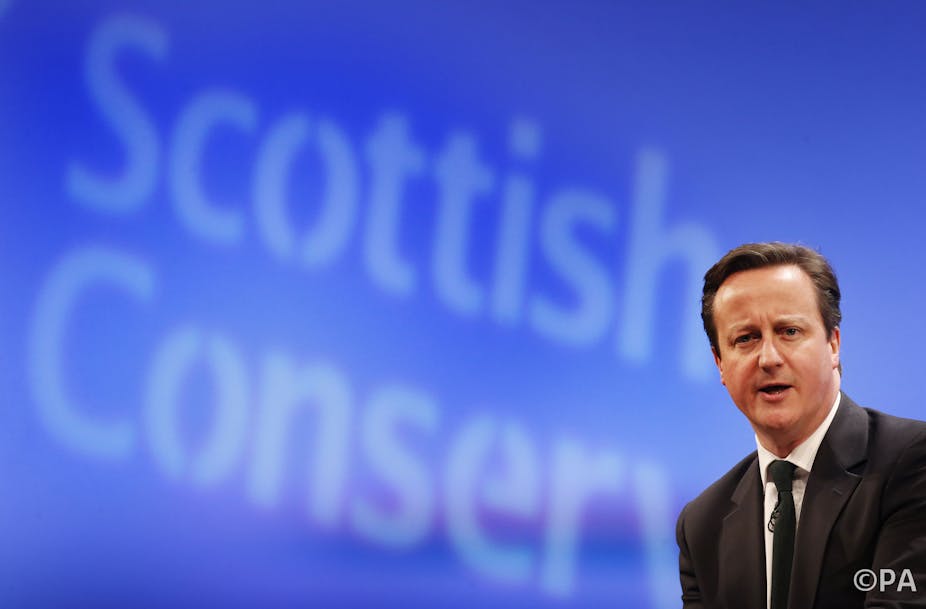The Better Together campaign has always had a problem. Such is Tory popularity in Scotland that the battle for the union was never going to be led by the biggest beast in British politics.
Yet David Cameron has found it hard to avoid the referendum altogether. This week he visits Scotland, only days after ruling out resigning if the union is lost – strategists reputedly feared this prospect might encourage Scots to vote yes.
Then there is the TV debate question. Cameron has always refused Alex Salmond’s demands for one, but has arguably muddied the water by indicating that he would debate with Ukip’s Nigel Farage over Europe. We asked our panel how best to steer Cameron through the Scottish thorns.
Karly Kehoe, senior lecturer in history, Glasgow Caledonian University
I don’t think that Scotland voting yes should be a resignation issue for Cameron. Too many politicians say they’ll resign if an issue doesn’t go their way. I see the offer of resignation as an indication of weak leadership.
There’s broad concern over the fact that the prime minister has agreed to debate with Farage but not with the leader of Scotland. Yes, the Conservatives and Cameron are unpopular in Scotland, but that has to be set aside -– David Cameron is the prime minister. He has a duty and a responsibility to engage fully with an issue that will affect the future of Britain. Farage is not a national leader, but like it or not, Salmond is.
Cameron might be coming up here, but the appearance is that he’s doing so now under tremendous pressure. People have noted the absence of the three main UK party leaders. These token trips mean virtually nothing. What the politicians at Westminster need to demonstrate to the Scottish public is that they understand the level of debate taking place here and that they are engaged with the issues.
There comes a point when the issues affecting a country and a nation are bigger than worries about re-election. Surely the future of Scotland within the United Kingdom is one of these bigger issues. Jon Snow called it right in his recent blog where he said that those at Westminster had better start paying attention to what’s going on in Scotland and to the fact that there’s a very high level of debate taking place.
There are some interesting parallels with Ireland and the Act of Union of 1801. From the late 1770s to roughly 1820, there had been a sense of real opportunity in Ireland. The Irish, Catholics and Protestant alike, engaged with the idea of Britain and with the opportunities of the British Empire.
When Ireland joined the union, there was a feeling that it would finally be able to absorb many of the socio-economic benefits that came along with that. Of course there was opposition to union, but it is important to point out that there was also firm commitment.
The problem was that as time passed it became more and more apparent that Ireland was never going to receive a broader level of acceptance within the union. One of the main issues connected with that was Catholic emancipation. That this was promised as a condition of union but then delayed until 1829 caused irreparable damage.
The failure of the political elite in London and the refusal of the King to deliver this meant that Ireland began to drift away and tensions increased. The promised of equality that was necessary for economic development did not materialise until it was too late.
The point which connects all of this to Scotland is that major constitutional issues need to be dealt with head-on. They cannot be avoided. The real risk we face at the moment is political mismanagement -– exemplified by the mismanagement of the referendum debate by as disconnected Westminster elite.
Arthur Midwinter, visiting professor of politics, University of Edinburgh
My view is that Cameron should leave it to the Scottish secretary to argue on behalf of the UK government and for Alistair Darling to speak for Better Together. Cameron should stay away from the campaign. I don’t think it’s helpful to have him coming here and presenting arguments. This is really a matter for Scots.
Keeping it going by making appearances allows Salmond to gripe about having a TV debate. Salmond is a divisive politician with a big ego. That’s why he wants to debate with the prime minister of the UK. But I don’t see the head of any of the UK administrations, be it Scotland, Northern Ireland or Wales, as being equivalent to the prime minister. So I don’t see why Cameron should feel obliged to debate with him.
The Treasury-led papers that his government produced were of a far higher standard than anything the Scottish government has produced. That should be their contribution. I don’t think he’s adding anything by appearing here. He’s probably going to say some vague and general things about the union, about how we’re a family and should stick together.
If Cameron keeps coming up while refusing to debate, it’s just going to be a running sore. He should close it down by leaving everything to the Scottish politicians. He shouldn’t have agreed to debate with Farage either. Why is he going to debate with him? He presumably thinks he can beat him by appearing reasonable. But I think it was a mistake.
As for the resignation question, if Cameron had played a leading role in the campaign, it would become a resignation issue if he lost. But he’s not leading the campaign. He’s making occasional interventions, like a lot of the politicians are. I think the reason why he ruled it out was more about the fact that there are some people in his own party that are unhappy with him rather than anything external. Just like in the Thatcher and Major years, people are looking for chances to get rid of him.
The Conversation’s previous panel pieces can be read here.

